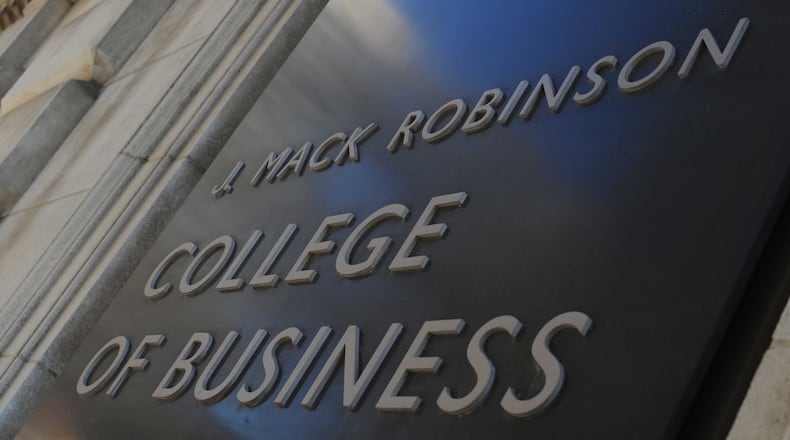Georgia State University Robinson College of Business administrators wanted to raise the school’s profile to attract top-flight students, according to a woman who worked there, and pressured workers to manipulate admissions data to make it look better in national surveys.
An employee complained via a hotline, an internal investigation began, and the findings were troubling.
Some low entrance exam results were intentionally deleted, investigators found. Waivers to omit test results from applications were routinely granted to students, although they didn’t request them, the investigators’ report says.
Kacy Jackson, who worked there for more than two years, said supervisors made her job so difficult after she complained about demands to change data that she resigned in January. Jackson filed a lawsuit last week against the University System of Georgia, which oversees operations at Georgia State, under the Georgia Whistleblower Act.
The complaint says Jackson and other employees were directed to manipulate admissions records by Toby McChesney, who was the assistant dean of graduate recruiting in the college.
Jackson, the whistleblower, said supervisors excluded her from meetings, refused to speak to her and removed job duties. She wants back pay and benefits, compensatory damages, and, possibly, a return to work there.
“Ms. Jackson refused to participate in and objected to conduct which she reasonably believed to be a violation of laws, rules, and/or regulations governing admissions practices at GSU,” the lawsuit says. “Ms. Jackson also reported this same unlawful conduct to GSU administrators, including the practice of deleting test scores to unlawfully manipulate admissions records and data, removing unfavorable documents from admissions files, and admitting students who did not meet the minimum requirements for admission, in violation of various Federal, state, and agency regulations governing GSU’s admissions procedures.”
Jackson’s attorneys did not return telephone calls seeking additional comment.
Georgia State officials stressed in an interview Tuesday afternoon they quickly investigated as soon as they learned about it and have made changes to prevent such actions, such as implementing a new system that prohibits employees from removing test scores.
“We just want to make the corrections to uphold the reputation of the Robinson College of Business,” said the college’s dean, Richard D. Phillips.
The investigation began after complaints of improper spending by the assistant dean for graduate recruiting and student services. The report says he “directed subordinates to have invoices altered so that charges for alcohol were changed to appear as food or facility charges so that they could be submitted for payment using state funds.” The assistant dean was terminated, and the investigation into manipulating admissions data began.
Efforts to contact McChesney, now an assistant dean at Santa Clara University, by telephone and email were unsuccessful Tuesday afternoon.
Phillips, who became dean in 2014, said he was unaware of the deletions, unsure when they began or why they were done. The report concluded employees did not receive a bonus or any financial incentives for their actions.
The lawsuit complaint says officials wanted to “delete low test scores to raise their average test scores for the graduate programs.” Test scores are typically a criteria used by some publications to determine how colleges rank academically. Some rankings are watched closely by college administrators who use them to recruit students. The Robinson College of Business has several such rankings listed on its website.
The 25-page internal report, marked “confidential” on each page in red, capital letters, received Tuesday by The Atlanta Journal-Constitution from the university, confirmed Jackson’s complaints. A spot check of more than 300 applications found only 31 percent contained graduate test score reports. The graduate school has 1,230 students this semester.
“[O]ur review of emails and files revealed that admissions personnel appeared to have routinely granted waivers and deleted test scores…for applicants with low scores,” the report said.
University officials declined to discuss the lawsuit, citing pending litigation.
Jackson’s complaint mentions she was reprimanded for admitting her boyfriend to a graduate program and falsely marking his admission fee as paid. She denied the claim, saying she recused herself and another employee was involved in the application process.
About the Author
Keep Reading
The Latest
Featured



